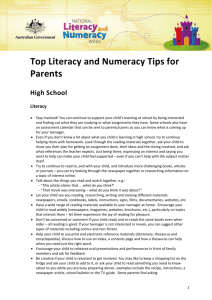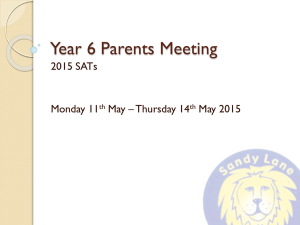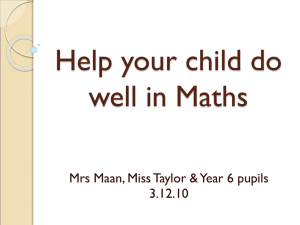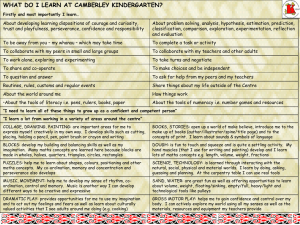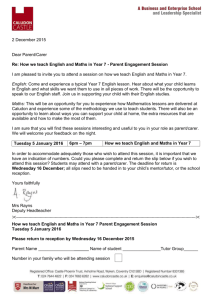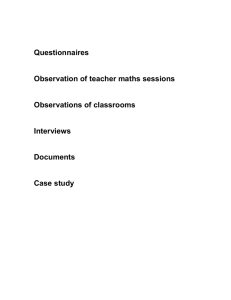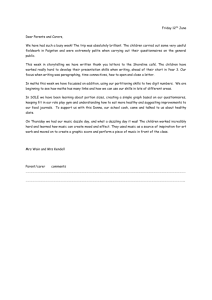Top Literacy and Numeracy Tips for parents – Primary Schools
advertisement
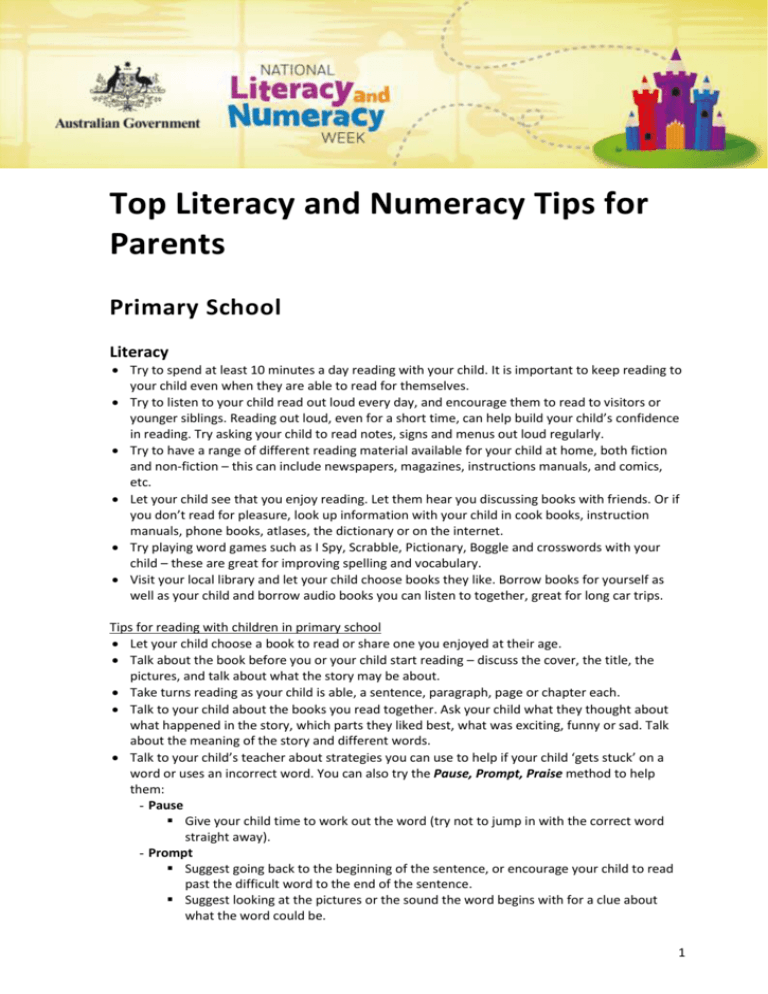
Top Literacy and Numeracy Tips for Parents Primary School Literacy Try to spend at least 10 minutes a day reading with your child. It is important to keep reading to your child even when they are able to read for themselves. Try to listen to your child read out loud every day, and encourage them to read to visitors or younger siblings. Reading out loud, even for a short time, can help build your child’s confidence in reading. Try asking your child to read notes, signs and menus out loud regularly. Try to have a range of different reading material available for your child at home, both fiction and non-fiction – this can include newspapers, magazines, instructions manuals, and comics, etc. Let your child see that you enjoy reading. Let them hear you discussing books with friends. Or if you don’t read for pleasure, look up information with your child in cook books, instruction manuals, phone books, atlases, the dictionary or on the internet. Try playing word games such as I Spy, Scrabble, Pictionary, Boggle and crosswords with your child – these are great for improving spelling and vocabulary. Visit your local library and let your child choose books they like. Borrow books for yourself as well as your child and borrow audio books you can listen to together, great for long car trips. Tips for reading with children in primary school Let your child choose a book to read or share one you enjoyed at their age. Talk about the book before you or your child start reading – discuss the cover, the title, the pictures, and talk about what the story may be about. Take turns reading as your child is able, a sentence, paragraph, page or chapter each. Talk to your child about the books you read together. Ask your child what they thought about what happened in the story, which parts they liked best, what was exciting, funny or sad. Talk about the meaning of the story and different words. Talk to your child’s teacher about strategies you can use to help if your child ‘gets stuck’ on a word or uses an incorrect word. You can also try the Pause, Prompt, Praise method to help them: - Pause Give your child time to work out the word (try not to jump in with the correct word straight away). - Prompt Suggest going back to the beginning of the sentence, or encourage your child to read past the difficult word to the end of the sentence. Suggest looking at the pictures or the sound the word begins with for a clue about what the word could be. 1 If prompts are not working, tell your child the word and briefly explain the meaning of the word but then quickly prompt them to continue reading. - Praise Give your child praise for trying, even if mistakes are made. For example you might say: “Well done, that was great reading. I thought it was fantastic how you went back to the start of the sentence to try and work out that tricky word for yourself.” Adapted from: http://www.schools.nsw.edu.au/media/downloads/languagesupport/hyc_rwss/rwycah/rwc_english.pdf http://www.schools.nsw.edu.au/gotoschool/a-z/reading.php http://www.curriculumsupport.education.nsw.gov.au/literacy/assets/pdf/parent/ppp_parent.pdf http://www.schoolatoz.nsw.edu.au/homework-and-study/english/english-tips/when-older-kids-struggle-withreading Numeracy Talk positively about maths with your child – even if you struggled with it at school yourself. Staying positive about maths will help your child. Saying "I was bad at maths" can lower a child’s own expectations of themselves at maths and can give your child an excuse not to try. Talk to your child about how you use maths in everyday life – while shopping, banking, budgeting, cooking, driving, and keeping score in sports games, telling the time etc. Help your child to see the real-life purpose for the maths they are learning at school e.g. when your child is learning fractions you could ask them: “How many slices will I need to cut the pizza into so that everyone has two slices?” “What fraction of the glass is filled with water?” “Can you cut up the apple to make six equal pieces?” Play games with cards, dominoes or dice to help your child with maths. Try asking your child to tell you the number of dots on the dice each time they are thrown during a board game. Eventually they will be able to do ‘see’ the number without having to count the dots. When you are helping your child with their maths homework and they get stuck, try to help your child solve the problem themselves by asking: "What is the problem asking you to do?" "How do you think we can work this out?" "Do you think you will need to use addition or subtraction, or do you need to use multiplication or division?" Ask your child to explain how they work things out – e.g. “What is the question asking you to do?” and “How did you get that answer?” With maths problems there is always more than one way to get the right answer. When you child thinks about how they figured out a problem, it can help concepts make more sense to them and build their confidence. Encourage your child to practise the times tables and ‘mental computation’ skills – working out answers to arithmetic questions in their head. Give your child little problems to solve in their head. Try asking them to: estimate the total cost of a small basket of groceries before reaching the checkout work out the actual cost of discounted items (e.g. 25% off $20) figure out when you will arrive at a destination (e.g. “It is 4:15 pm now. It will take us 30 minutes to get home – what time will we arrive?”). Talk with your child about how they feel about maths. They may not always be willing to discuss problems they're having, but it is important to show your support and that you are interested in what they are learning. If your child is having difficulties with maths, speak to your child’s teacher or write them an email or short note. Once problems are identified, learning patterns can be better understood and a solution can be developed. 2 If you are finding it difficult to explain how to solve a maths homework problem, ask your child’s teacher for advice and examples. Teachers understand that maths problems are sometimes taught differently from when you were at school. Some schools offer maths information sessions for parents. Encourage them to practise, practise, practise! Maths is a learned skill that improves with practise. Encourage your child to get their hands on as much practise material as possible – and do it as part of a regular routine. Adapted from: http://www.education.vic.gov.au/Documents/school/parents/primary/201years3to6mathstips.pdf http://www.schoolatoz.nsw.edu.au/homework-and-study/mathematics/mathematics-tips/tips-for-tweens-whofind-maths-hard http://www.nlnw.nsw.edu.au/pdfs/kit06/middlesc.pdf http://www.schoolatoz.nsw.edu.au/homework-and-study/mathematics/mathematics-tips/helping-your-child-withmaths http://www.schoolatoz.nsw.edu.au/homework-and-study/mathematics/mathematics-tips/helping-young-kids-getmaths 3
